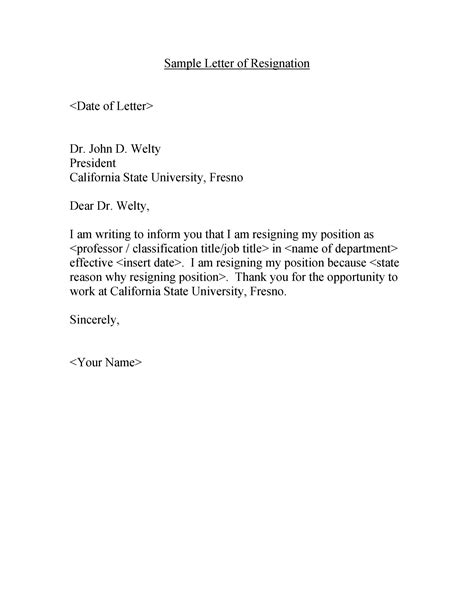Resignation Letters For Personal Reasons: Top Sample Formats In English

Resigning from a job is never an easy decision, especially when it is for personal reasons. However, it is important to approach the situation professionally and respectfully. One crucial step in the resignation process is writing a resignation letter. In this article, we will provide you with top sample formats for resignation letters for personal reasons.
1. Heading: Addressing the Recipient
The first step in writing a resignation letter is addressing the recipient. Start the letter with a proper salutation, addressing your immediate supervisor or the relevant authority figure within the organization. Use their full name and job title if possible.
2. Introduction: State Your Intentions
In the introduction of your resignation letter, clearly state your intention to resign from your position. Mention the date of your resignation and provide a brief explanation for your decision. It is important to maintain a professional tone and avoid going into unnecessary details.
3. Body: Explain Your Reasons
In the body of your resignation letter, you can elaborate on your personal reasons for resigning. It is essential to be honest and transparent, while still maintaining professionalism. You may mention personal circumstances, health issues, family responsibilities, or career changes that have led to your decision.
4. Express Gratitude: Acknowledge the Experience
Express gratitude for the opportunities and experiences you had during your tenure with the organization. Highlight any personal or professional growth you have achieved as a result of your employment. This shows appreciation and leaves a positive impression.
5. Offer Assistance: Ensure a Smooth Transition
In your resignation letter, offer your assistance in ensuring a smooth transition for your replacement. This can include providing a detailed handover document, training your successor, or making yourself available for any questions or clarifications.
6. Conclusion: End on a Positive Note
Conclude your resignation letter on a positive note. Reiterate your appreciation for the opportunities and express your hope for the continued success of the organization. Offer your contact information if they need to reach out to you in the future.
7. Proofread and Edit: Check for Errors
Before submitting your resignation letter, make sure to proofread and edit it for any errors or typos. Ensure that your letter is concise, clear, and free from any grammatical mistakes. A well-written and error-free letter reflects professionalism and attention to detail.
8. Sample Resignation Letter for Personal Reasons
Here is a sample resignation letter for personal reasons:
[Your Name]
[Your Address]
[City, State, ZIP]
[Email Address]
[Phone Number]
[Date]
[Recipient’s Name]
[Recipient’s Job Title]
[Company Name]
[Company Address]
[City, State, ZIP]
Dear [Recipient’s Name],
I am writing to formally resign from my position as [Your Position] at [Company Name], effective [Last Working Date]. It is with a heavy heart that I make this decision, but due to personal reasons, I believe it is the best choice for me at this time.
Over the past [duration of employment], I have had the privilege of working with a talented team and gaining valuable experience. I am grateful for the opportunities and support provided to me during my time at [Company Name].
I understand the impact my resignation may have on the team and the organization. To ensure a smooth transition, I am committed to providing any necessary assistance during this period. I will be more than happy to document my current projects and responsibilities, as well as train my replacement, if required.
Once again, I want to express my sincere gratitude for the opportunities and experiences I have had at [Company Name]. I am confident in the continued success of the organization and wish everyone the best.
Please feel free to contact me at [Email Address] or [Phone Number] if you require any further information or have any questions.
Thank you for your understanding and support.
Sincerely,
[Your Name]
FAQs
1. Should I mention specific personal reasons in my resignation letter?
While it is not necessary to provide specific personal details in your resignation letter, you may choose to do so if you feel comfortable. However, keep in mind that maintaining professionalism and privacy is important.
2. How much notice should I give when resigning for personal reasons?
It is customary to give at least two weeks’ notice when resigning for personal reasons. However, depending on the circumstances, you may need to provide more notice to allow for a smooth transition.
3. Can I resign immediately for personal reasons?
In certain situations, such as health emergencies or family emergencies, it may be necessary to resign immediately. However, it is recommended to provide as much notice as possible to ensure a smooth transition for the organization.
4. How should I inform my colleagues about my resignation?
After submitting your resignation letter, it is courteous to inform your colleagues and immediate team members in person. Schedule a meeting or have a conversation to explain your decision and express your gratitude for their support.
5. How can I maintain a positive relationship with my employer after resigning?
To maintain a positive relationship with your employer after resigning, it is important to be professional and cooperative during the transition period. Offer your assistance, complete any pending tasks, and leave on good terms.
